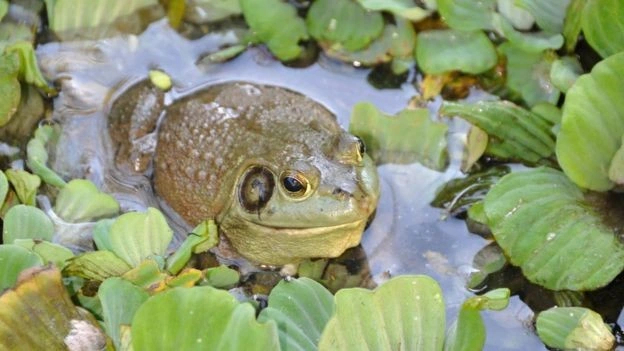November 24, 2025 | 08:03 GMT +7
November 24, 2025 | 08:03 GMT +7
Hotline: 0913.378.918
November 24, 2025 | 08:03 GMT +7
Hotline: 0913.378.918

Bullfrogs in the United States are more or less immune to Chytrid fungus but transmit the disease to other susceptible amphibians.
According to Korea’s Notification G/SPS/N/KOR/798, issued before the 88th Session of the SPS/WTO Committee, the Ministry of Oceans and Fisheries of Korea is asking for opinions from WTO members on the draft “Aquatic Organism Disease Control Act.”.
Among them, three types of amphibian diseases are considered legally controlled diseases, including: Batrachochytrium dendrobatidis (Bd fungal), Batrachochytrium salamandrivorans (Bsal fungal) and Ranavirus.
The new law applies to all countries exporting seafood to Korea, including live aquatic animals (fish, molluscs, crustaceans) and chilled frozen shrimp with groups of amphibians live. Corresponding HS codes: 0301, 0306, 0307, 0106.
The Bd fungus strain, which is a type of Chytrid fungus, is the main cause of toadfish populations in Europe being on the brink of extinction. It is also seriously threatening amphibian diversity globally.
When attached to animal skin, this microorganism prevents the host from exchanging salt and water with the environment. The disease causes irreversible damage and eventually causes the animal to die of heart failure due to suffocation. Infected animals are less likely to survive.
While the Bd fungal has been mentioned since the early 20th century, the Bsal fungal strain is considered to have been discovered only about 10 years ago, when scientists noticed a sudden decline in fire salamander populations in Netherlands. The disease causes skin damage, sepsis and is easily spread.
Similarly, Ranavirus disease is quite common in amphibians. The main symptoms of the disease are skin lesions, bleeding and organ failure.
After assessing the risk, the Korean Ministry of Oceans and Fisheries proposed official control of the above three diseases. At the same time, develop detailed procedures for registering, amending, renewing... animal and animal product processing facilities abroad when exporting to the East Asian country.
Your side also included in the draft the content of direct inspection of seafood export facilities abroad to control epidemics, as well as research on the legal basis to suspend imports according to on-site inspection results, or analyze import risks, to prevent the spread of epidemics in emergency situations.
Korea said that WTO member countries have 60 days from the date of circulation of the notification to respond. By May 12, 2024, this country will stop receiving comments, proceeding to make an official announcement expected on June 21.
Vietnam is currently the third largest seafood supplier to Korea. In 2023, Vietnam exported more than 150 thousand tons, reaching a value of about US$ 800 million. After 8 years of implementing the Vietnam - Korea Free Trade Agreement (VKFTA), Vietnam's export value to the other side continuously shows signs of improvement.
In the structure of Vietnam's seafood products exported to Korea in 2023, shrimp accounts for the highest proportion of 43.6%, followed by squid and octopus, accounting for 31.4%. Other types of fish (except pangasius and tuna) have the third largest export turnover to Korea, accounting for 20.8%.
The remaining items that account for a small proportion to Korea are tuna, pangasius, crabs and other crustaceans, bivalve molluscs and other mollusks (0.3% to 2.2%).
Korea is Vietnam's largest import market for squid and octopus, accounting for 37% of total export value. Meanwhile, Vietnam ranks second in supplying squid and octopus to Korea, after China. In 2023, squid and octopus exports to Korea will reach more than US$ 247 million, down 8% compared to 2022.
VASEP forecasts that in 2024, Korea's seafood imports will likely increase again when the Korean economy is likely to regain growth momentum. The Bank of Korea (BOK) estimates that the country's economic growth will reach 2.1% in 2024, up from 1.4% in 2023.
Dr. Ngo Xuan Nam, Deputy Director of the Vietnam SPS Office, said that the Korean market is very potential for Vietnam. Faced with changes in aquatic organism disease control, he requested businesses and industry associations to proactively monitor and capture information from management agencies to make timely adaptations and avoid trade disruptions. Opening a market for agricultural and aquacultural products typically requires a significant amount of preparation time, ranging from five to six years, for both parties to agree on SPS measures and related procedures. "A singular flagged batch can potentially damage businesses and the position and brand of Vietnamese agricultural products. Furthermore, the importing country may consider increasing the frequency of inspections and adding import procedures in the future," Mr. Nam said.
Translated by Tuan Huy

(VAN) The agricultural sector is finalizing the strategic framework for emission reduction, setting the goal of sharply cutting methane and 403.7 million tons of CO2 equivalent and moving toward Net Zero by 2050.
/2025/11/22/2236-1-153832_483.jpg)
(VAN) The National Marine Spatial Planning is opening up opportunities for sustainable blue sea development across 21 coastal localities.

(VAN) Viet Nam’s forestry sector is undergoing a comprehensive transformation, strengthening management, protection, and development efforts to maintain ecological security and drive green, sustainable growth.

(VAN) Viet Nam is accelerating efforts to digitize reservoir operations, from real-time data to hydraulic modelling.
/2025/11/21/3348-2-102623_454.jpg)
(VAN) National Assembly delegate Nguyen Thi Lan has proposed adding special mechanisms to attract human resources to the agricultural, forestry, and fishery sectors, addressing the shortage of high-quality personnel.

(VAN) Over the past two decades, the unified legal framework for water resource management has been perfected, becoming a crucial foundation for ensuring national water security.

(VAN) The land-data cleansing campaign in Dien Bien is entering its final stretch, yet weak infrastructure, limited personnel and fragmented multi-period datasets continue to create major obstacles.